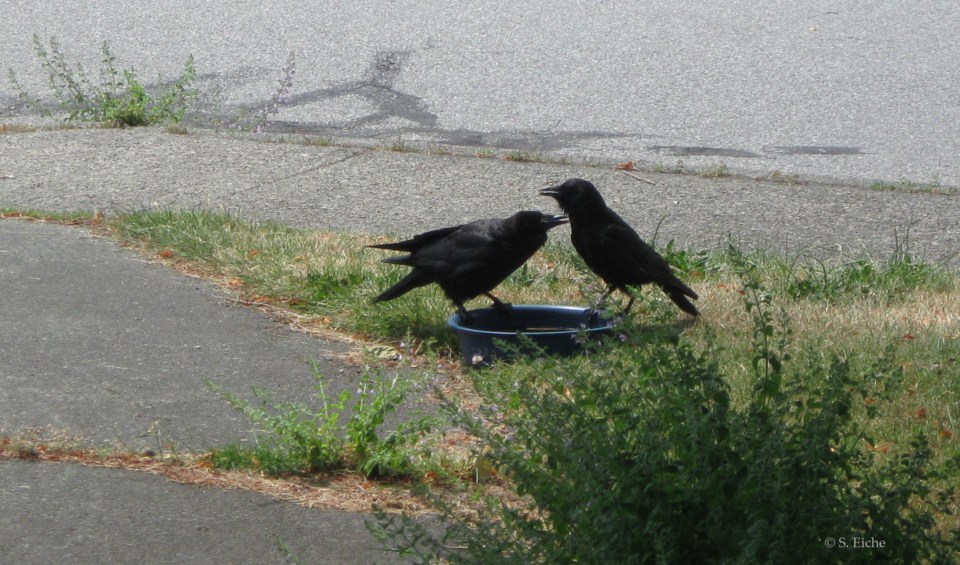How do crows decide whether or not you meet their standards for the crow-human relationship? I believe they have a strategy. They study your situation to determine whether you’re worth spending time with. They assess you.
They sit on lamp posts or tree branches, processing what they see. How many perching places have you got? How many saucers filled with water? Are they conveniently located? Are they big enough to bathe in? Are they big enough for soaking bread, lobster claws, bones with bits of meat on them? Could you be trained to offer crow-worthy snacks such as peanuts, chafer grubs, or cutworms?
I was first ‘registered’ in the crows’ list of acceptable humans five years ago. Mrs Crow arrived one day early in 2017, sat on the edge of one of my garden beds, and started meowing like a cat. That did it for me – I was hooked. She’d come daily and soon got into the habit of flying onto my car roof, her special way of telling me to hurry up with the peanuts.
In the spring she brought her new baby, and the two of them always arrived together after that. The child, however, never followed its mother onto the car roof. I couldn’t decide if it was out of respect or fear. It always seemed to submit to Mrs Crow’s authority. I finally concluded it was a bit of a wimp, not what I’d have expected from an offspring of someone of Mrs Crow’s character.
Another baby followed in 2018, so then I had three crows coming for their daily ration of peanuts, cutworms and chafer grubs. The 2018 child was very different from its older sibling. It dared to jump onto the car roof alongside Mrs Crow, who must have approved of this behaviour because she never ticked it off.
I was looking forward to the crow baby of 2019, but it didn’t come, although I know it had hatched because I’d heard the sound baby crows make. Something happened that year, and I’m still not sure what it was. One day, Mrs Crow was pecking at peanuts on the driveway with her offspring from 2017 and 2018. Suddenly she froze. She’d heard something. I’d heard it too – another crow cawing insistently from somewhere in the neighbourhood. She took off in a flash, abandoning the peanuts, and without a glance at the two youngsters, who followed their mother as fast as their wings could take them.
Day after day I waited for Mrs Crow to return. She didn’t. 2019 gave way to 2020 and brought that dreaded virus, but no Mrs Crow or her offspring.
Then, in 2021, something very strange occurred. I was in the driveway, when I heard a noise behind me. I turned around – a crow had landed not two feet from where I was standing. That was rather fearless. Could it possibly be my old friend? I saw a distinctive mark on the right wing, a mark that Mrs Crow had had. And when she flew onto my car roof, I was sure of her identity. I ran into the house for peanuts. That afternoon I replenished my peanut supply, but Mrs Crow never returned. I believe she’d made a special visit just to let me know she hadn’t forgotten me.
I’d almost given up hope of seeing anyone in that crow family ever again, when something wonderful happened. One morning a few weeks ago, as I was about to go into the house, I heard an odd noise, almost a grunt. I looked up and saw a crow on my car roof. It appeared slimmer and younger than Mrs Crow and it lacked that distinctive mark. It had to be her offspring from 2018, the only other crow who ever dared fly onto my car roof. She needed a name – ‘Roofie’ seemed to suit her. Roofie had come with her own offspring, who didn’t dare join her on top of the car. They’re now regular visitors.
One day last week I’d parked my car on the street. The carport was empty. When I came out the door, Roofie swooped in, landing on the driveway. The lack of the car roof didn’t seem to bother her. I found this interesting – changes in routine left her unperturbed. I said to her, “You’re a pretty smart crow.” At the precise moment I spoke those words, Roofie turned her head and peered at me with her left eye. I could read her thoughts as clearly as if they were spelled out: “For a human, you’re not that dumb after all.”
Sabine Eiche is a local writer and art historian with a PhD from Princeton University. She is passionately involved in preserving the environment and protecting nature. Her columns deal with a broad range of topics and often include the history (etymology) of words in order to shed extra light on the subject.



